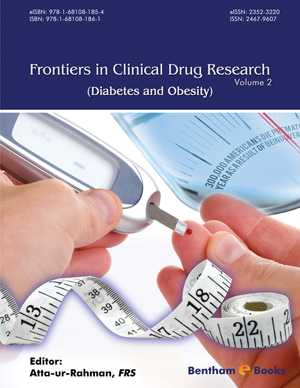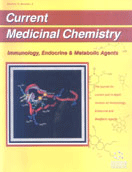Abstract
This chapter firstly presents selected clinical studies to evaluate the current drugs as well as emerging new drugs for type 2 diabetes mellitus (T2DM) and obesity, and secondly presents future drug candidates under pharmacological research. The current drugs are α-glucosidase inhibitors, glinide, sulfonylurea (SU), incretin-based therapies, including dipeptidyl peptidase 4 (DPP-4) inhibitors and glucagon-like peptide-1 (GLP-1) receptor agonist, thiazolidinediones (TZDs), biguanides, insulin, in particular, short acting and long acting insulin analogs. Anti-obesity drugs available at present are intestinal lipase inhibitor. Most of central regulators of appetite are not used mainly because of their cardiovascular adverse events. Better glycemic control was compared among various drug combinations; DPP-4 inhibitors vs. TZDs add-on to metformin, DPP-4 inhibitors vs.GLP-1 receptor agonist add-on to metformin or other oral hypoglycemic therapy (LEAD-6), DPP-4 inhibitors vs. placebo with and without SU, short acting insulin analog vs. DPP-4 inhibitors add-on to metformin (EASIE study) or vs. placebo on GLP-1 receptor agonist add-on to metformin and SU. Effects on morbidity and mortality have been evaluated between intensive and conventional glycemic control. Intensive glycemic control caused more frequent severe hypoglycemia and did not necessarily ameliorate prognosis being much better as compared with conventional glycemic control. Effects were also evaluated among the following drugs; DPP-4 inhibitors vs. SU, glinide (NAVIGATOR study), basal supported oral therapy (BOT), basal plus or basal bolus (ORIGIN trial), and insulin vs. other anti-hyperglycemic therapies. Emerging new drugs for T2DM and obesity are salt glucose cotransporter 2 (SGLT2) inhibitors, glucokinase activators, and anti-obesity drugs such as lorcaserin and phentermine-topiramate, both of which are central appetite regulators with less adverse events. These are prospective drugs but still need investigations to decide their clinical usefulness and safety. Pharmacological research for T2DM and obesity are underway. Various new drugs such as the following may be promising; cyclindependent kinase 5 inhibitor, leptin, adiponectin mimetics, SIRT1 activators, neuropeptide Y2 receptor antagonist, 11-hydroxysteroid dehydrogenase type 1 inhibitor, interleukin-6, betatrophin, chemerin, dilauroyl phosphatidylcholine, 1- deoxynojirimycin, fibroblast growth factor(FGF)21, FGF1 and stearoyl-coenzyme A desaturase-1 inhibitors.
Keywords: Type 2 diabetes mellitus, obesity, drug, randomized control trial, pharmacological research, metformin, incretin-based therapies, DPP-4 inhibitors, GLP- 1 receptor agonist, insulin, glycemic control, morbidity, mortality





















